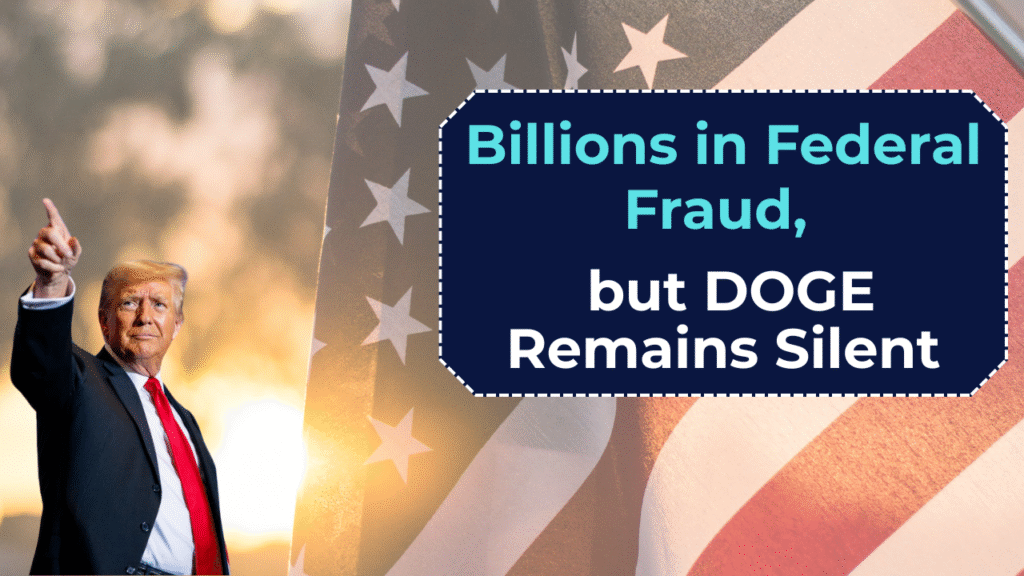Federal fraud remains one of the most pressing and persistent issues facing the U.S. government today. Despite the creation of oversight bodies and watchdogs, instances of waste, abuse, and mismanagement of taxpayer funds continue to plague federal programs. Surprisingly, the Department of Government Oversight and Enforcement (DOGE), an entity tasked with monitoring and responding to such violations, has shown a consistent pattern of inaction. This silence is raising eyebrows in both political and civil society circles.
Billions Lost to Federal Fraud
Each year, billions of dollars are lost due to fraudulent claims, improper payments, and contract mismanagement across multiple federal agencies. Programs intended to support vulnerable populations including Social Security, Medicare, Medicaid, and pandemic relief initiatives are particularly susceptible.
The Government Accountability Office (GAO) regularly publishes data on “improper payments,” a term encompassing payments made in error, as well as those resulting from fraud. In fiscal year 2023 alone, improper payments across federal programs totaled over $250 billion. The GAO also points out that many agencies fail to even estimate or report their full improper payment data, suggesting the real number may be significantly higher.
The Role and Responsibility of DOGE
The Department of Government Oversight and Enforcement (DOGE) was established to function as an independent watchdog tasked with identifying fraud, enforcing federal accountability standards, and protecting public funds. It has investigative powers and is mandated to publish public reports, launch criminal referrals when necessary, and recommend policy reforms.
Yet, despite a growing number of red flags, DOGE’s track record shows limited action against repeat offenders and major cases of financial misconduct.
Limited Investigations, Minimal Enforcement
Recent audits and congressional testimony have revealed that DOGE conducted only 27 investigations in fiscal year 2024, a steep decline from its 83 investigations in 2021. Of these, fewer than 10 resulted in enforcement action or referrals to the Department of Justice.
Former DOGE staffers, speaking under condition of anonymity, attribute the drop to internal restructuring, underfunding, and political pressure. There have also been accusations of top-level appointments prioritizing image management over actual enforcement.
High-Profile Cases Ignored
Several high-profile fraud cases have brought DOGE’s inaction into the spotlight.
Pandemic Relief Fraud
Between 2020 and 2023, an estimated $135 billion was fraudulently claimed through the Paycheck Protection Program (PPP) and other COVID-19 relief efforts. While some agencies like the Small Business Administration have stepped up recovery efforts, DOGE has been conspicuously silent on most of these cases.
Despite receiving detailed referrals from state-level inspectors general and nonprofit watchdog groups, DOGE has failed to initiate a large-scale investigation or propose legislative reforms.
Defense Contracting Abuses
In 2022 and 2023, several reports surfaced about defense contractors overbilling the Department of Defense (DoD) by tens of millions of dollars. One report, verified by multiple agencies, revealed a contractor charging $91 for a part with a market value of $2.
While the DoD’s own Office of Inspector General issued strong statements, DOGE made no public acknowledgment or commitment to investigate, fueling criticism that the agency may be intentionally sidestepping politically sensitive sectors.
Why Is DOGE Silent?
Analysts and advocacy groups point to several possible reasons for DOGE’s inaction.
Political Influence
Some experts suggest DOGE’s leadership has been pressured by political actors to avoid certain investigations, particularly those that could embarrass powerful government agencies or large corporations. Several watchdog groups have noted that DOGE’s budget requests have been approved without significant scrutiny possibly in exchange for a less confrontational oversight approach.
Internal Dysfunction
Insiders also cite internal inefficiencies and poor morale. After a major leadership shakeup in 2022, numerous senior investigators resigned. Since then, DOGE has struggled to retain qualified personnel with the legal and forensic experience necessary to pursue complex fraud cases.
Lack of Transparency
DOGE’s refusal to publish complete data on its investigations, funding allocations, and internal performance metrics further adds to public skepticism. Transparency is essential for public trust in oversight bodies, and DOGE’s opacity stands in stark contrast to agencies like the GAO or the Office of Management and Budget (OMB), which regularly update the public with detailed reports.
Calls for Reform Grow Louder
Lawmakers from both parties are now calling for a thorough audit of DOGE’s performance. Bipartisan bills have been introduced in Congress seeking to enhance DOGE’s reporting requirements, enforce accountability benchmarks, and restructure the leadership appointment process to ensure independence.
At the same time, civil society organizations have launched campaigns to increase public awareness of DOGE’s role — and its current failings. These groups argue that without a robust oversight agency, federal fraud will only worsen, eroding public trust in government institutions.
Conclusion
The federal government continues to lose staggering amounts of money each year due to fraud and mismanagement money that could otherwise go toward healthcare, education, or infrastructure. The Department of Government Oversight and Enforcement was created to address this problem. Yet, its lack of initiative, transparency, and enforcement reveals a troubling institutional failure.
As Congress debates the future of federal oversight, one thing is clear: accountability can no longer be optional. If DOGE continues to ignore rampant federal fraud, the consequences won’t just be financial they’ll be deeply political and societal.




